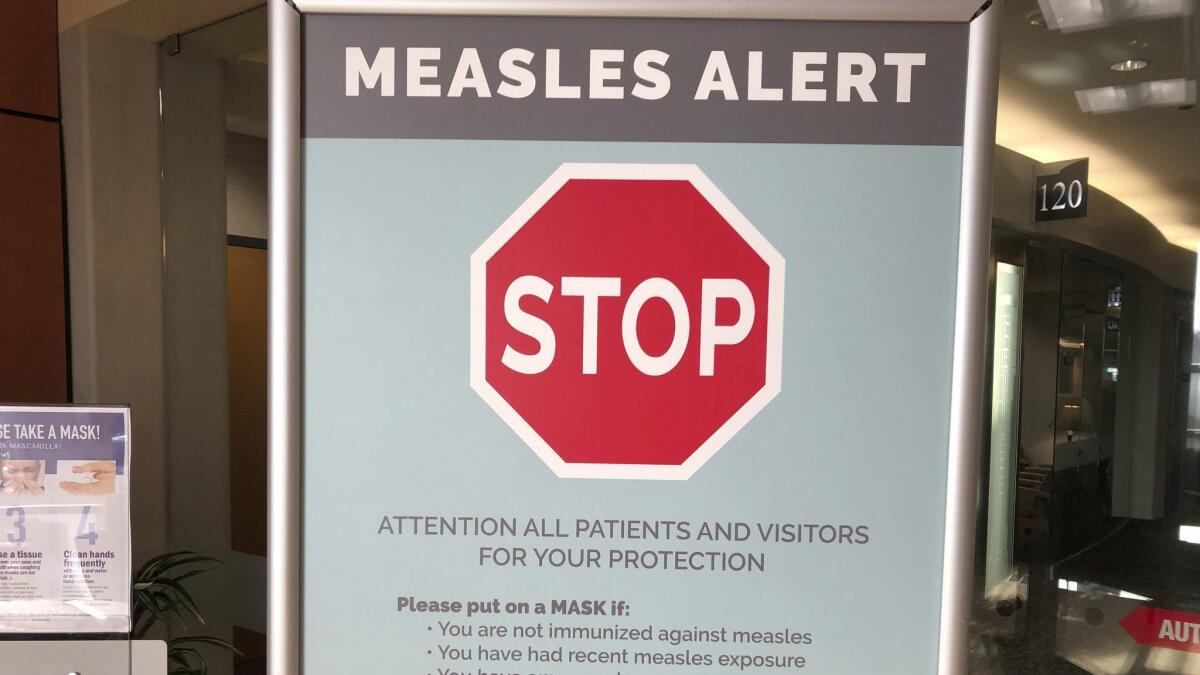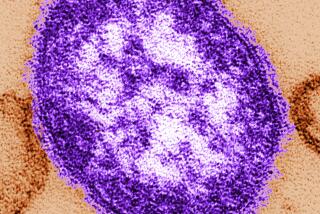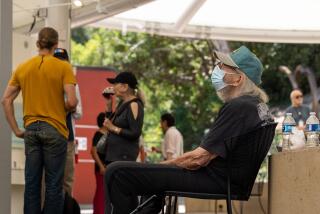Editorial: Measles is back and we only have ourselves to blame

- Share via
The United States shut the door on measles, one of the most contagious diseases known to humans, in 2000 — declaring it to have been “eliminated,” for all intents and purposes. Success in fighting the disease at home and abroad has meant that countless children have been spared suffering, injury and death.
But now, through a combination of lax vaccination enforcement and an insidious misinformation campaign based on junk science and unfounded fears, we are allowing the disease to creep back in. Shame on us.
Los Angeles is experiencing the direct results of this resurgence. Last week, public health officials were forced to place hundreds of students at UCLA and Cal State Los Angeles in quarantine after learning they had been exposed to the disease. While things have returned mostly to normal on those campuses, local cases are still turning up. Health officials reported a seventh measles case in Los Angeles County on Thursday and Orange County reported its first case on Wednesday and warned that the sick person may have exposed others at a screening of “Avengers: Endgame.”
Parents continue to believe that vaccination is a bigger risk to the health of their kids than measles. That’s not just magical thinking; it’s reckless.
Eight local cases may not seem like a lot, but consider what’s happening elsewhere in the country and the world. So far this year, the nation has reported more than 700 cases of measles in 22 states, the largest number in a single year since 1994. Globally, measles cases are up more than 300% this year. Massive outbreaks have occurred among unvaccinated people in the Philippines, Venezuela, Israel and many other countries. Foreign outbreaks are dangerous for places like Los Angeles, where millions of foreign travelers visit or pass through the airport every year. (Some of the possible exposure sites in this recent outbreak were at LAX terminals.) Just one infected person can expose hundreds if not thousands of people before they know they are sick. That’s what happened at Disneyland in 2014 when one sick person infected more than 150 others.
Serious outbreaks, however, are unlikely in populations with “herd immunity” — that is, a vaccination rate of 95% or higher. The problem is that years of immunization opt-outs and exemptions for schoolchildren, propelled by a growing anti-vaccination movement, have left vaccination rates in some places below the level they need to be. That was a factor in quarantines on the two L.A. campuses, where students may be part of what’s called the “Wakefield generation.”
Andrew Wakefield, a British scientist, may be more responsible for the current outbreaks than any other person because of a paper he published in 1998 falsely linking vaccines to autism. The paper was later discredited but it was too late. This false narrative was seized upon by a few irresponsible people opposed to vaccination and has proved as durable, and deadly, as measles itself. Fears about the safety of the vaccinations are driving outbreaks around the globe.
Enter the Fray: First takes on the news of the minute »
It doesn’t seem to matter that studies have shown again and again — and again — that the measles-mumps-rubella vaccine is safe and does not cause autism. Some parents continue to believe that vaccination is a bigger risk to the health of their kids than measles. That’s not just magical thinking; it’s reckless.
Thankfully, public concern about the return of measles is growing. Facebook, one of the most prolific vectors in measles misinformation transmission, is actively working to curtail anti-vaccination propaganda on its platforms. Health officials are ramping up vaccination education and lawmakers in California and other states are tightening up loose childhood immunization requirements.
We need to shut the door on measles again. This time for good.
Follow the Opinion section on Twitter @latimesopinion and Facebook
More to Read
A cure for the common opinion
Get thought-provoking perspectives with our weekly newsletter.
You may occasionally receive promotional content from the Los Angeles Times.









